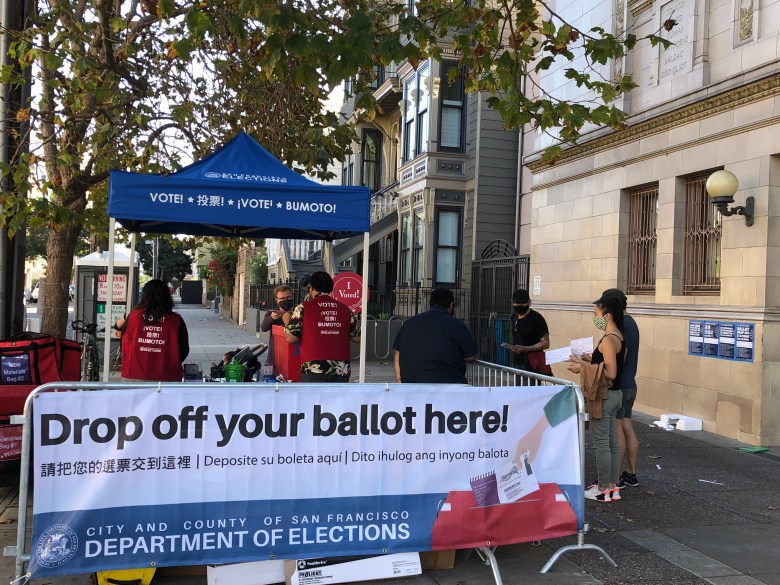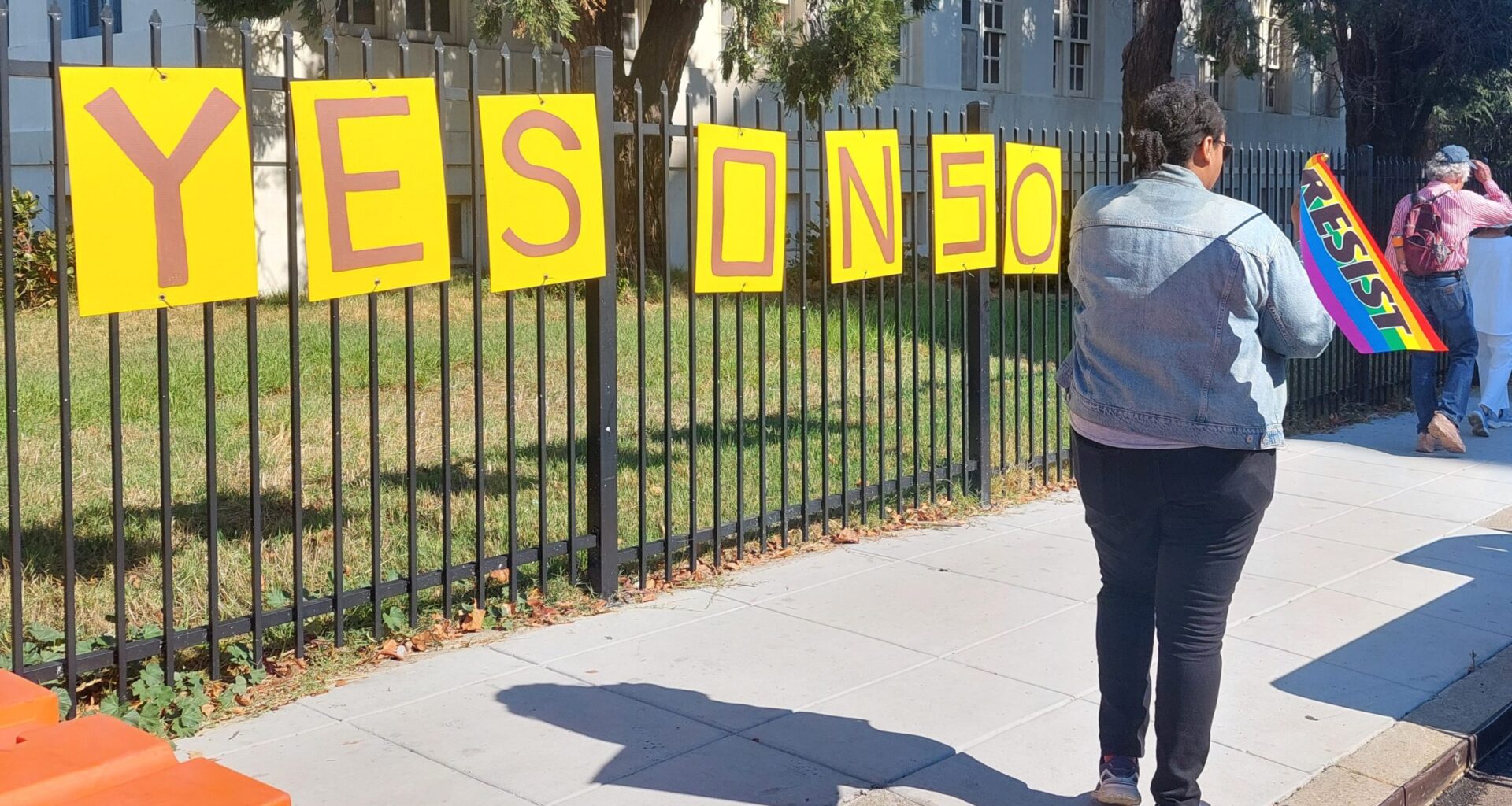Proposition 50, a contentious California measure to redraw congressional districts, which experts say could flip five Republican seats, is poised to give Latinos a big say at a time when economic pessimism has spread in this voting bloc.
Latino community leaders note that several factors, including the rising cost of living and threats to civil liberties, have culminated in “buyers’ remorse” as Latinos who voted conservatively seem ready to move leftward.
On Nov. 4, California voters will decide whether to approve new maps that will last until 2030, when an independent state commission draws new ones based on the regular decennial U.S. Census. The special election is in response to off-cycle redistricting approved in Texas in August intended to bring Republicans five additional seats in Congress in the midterm elections, a move politicians there made at President Trump’s behest.
California’s proposition would redraw almost every congressional district, a move aimed at turning five Republican seats Democratic: two in Northern California, one in the Central Valley and two in Southern California.
While Texas lawmakers set off this partisan feud months ago, Prop. 50’s opponents call the measure a power grab by Democrats that would set a precedent for redrawing districts for political gain. Supporters say it would make for a fairer nationwide election by leveling the playing field after Texas’s action.
A recent poll highlights the political leverage that Latinos might hold in the Prop. 50 vote.
Yvette Martinez, executive director of the California Democratic Party, said Latinos are at an inflection point with this election.
“For years, the Latino vote, even statewide and in many cities, was taken for granted, or disregarded, or ignored, or engaged in a certain disingenuous way,” Martinez said. “But now, the force and presence of Latino voters is undeniable.”
Voter surveys are particularly revealing in light of often aggressive actions by U.S. Immigration and Customs Enforcement. In September, the Latino Community Foundation, a San Francisco-based nonprofit organization, collaborated with BSP Research on a public opinion poll to gauge how California Latinos lean politically.
The research found that about 46% of Latinos who responded favored Prop. 50, while 20% were against, 29% were undecided and 6% said they chose not to vote (the total exceeds 100% due to rounding).
In the same survey, 66% of Latinos expressed fear of voting in person, worrying that federal officers would be monitoring polling locations.
 San Francisco voters have several options to vote before Election Day, including dropping off vote-by-mail ballots in convenient locations, as many did at the Mission branch of the San Francisco Public Library in 2020. Credit: Michael Stoll / San Francisco Public Press
San Francisco voters have several options to vote before Election Day, including dropping off vote-by-mail ballots in convenient locations, as many did at the Mission branch of the San Francisco Public Library in 2020. Credit: Michael Stoll / San Francisco Public Press
Gary Segura, founding partner and president of BSP Research, explained that many Latino families come from a “mixed status” background, meaning some in the household have citizenship and others do not. So even if eligible voters don’t fear deportation, they could be afraid of harassment at polling places, Segura said.
While most California voters, including Latinos, prefer to vote by mail, the data highlights a larger sentiment among Latinos of voter intimidation at a time when their participation could matter the most.
Opportunity for Latino representation
Segura anticipates that the Latino voter turnout will be higher than in other special elections, though not on par with a general election. He notes that the high percentage of Latinos leaning “yes” on Prop. 50 could be a simple partisan effect, since 55% of registered Latino voters in the state are Democrats.
But the pushback could also be motivated by the Republicans’ strong promotion of immigration crackdowns that largely target Latino communities. Latinos have the chance to push for their interests to be better represented, advocates say. As of 2023, 29% of registered voters in the state were Latino, according to one estimate.
Because of this, Prop. 50 is likely to increase the number of Latino-influenced seats, if not Latino representatives outright, community leaders said. The poll also found that 85% of California Latinos deemed it important for the temporary maps to create fair opportunities for Latino candidates to win in congressional elections.
The California GOP did not respond to requests for comment.
Martinez pointed to instances of prominent leaders being physically attacked for opposing federal raids on Latinos’ workplaces, homes and public spaces as galvanizing the community into political action in this election.
On June 10, David Huerta, president of the Service Employees International Union California and SEIU-United Service Workers West was arrested at a protest against immigration raids in Los Angeles. Two days later, U.S. Sen. Alex Padilla, Democrat of California, was forced from a press conference after asking Homeland Security Secretary Kristi Noem about immigration enforcement actions.
“That is truly frightening in our community,” Martinez said. “People seem to be more motivated to get involved and help us organize and win Prop. 50.”
Carlos Solórzano-Cuadra, CEO of the Hispanic Chambers of Commerce of San Francisco, finds that Latinos he talks with avoid politics because they feel neither Republicans nor Democrats represent their interests.
“We can make a difference in a change for our favor if we are able to have more districts,” Solórzano-Cuadra said. “That’s why for us, having more opportunities — not only to have more candidates — we will have more of an opportunity to participate in the game.”
Latinos nationwide made headlines in the 2024 presidential election when 46% of Latinos voted for Trump, compared with 66% voting for former President Joe Biden in 2020. In 2016, only 29% voted for Trump. While the vote might look different this year, research by the Latino Community Foundation showed a clear conservative leaning in the Central Valley and the Inland Empire, centered on San Bernardino and Riverside counties.
Segura ties this to Latino males feeling that Biden was not a strong leader, especially after he failed to deliver on promises he made to the Latino community. Biden took office promising comprehensive immigration reform and an increased federal minimum wage, neither of which happened.
The geographic component of Latino voting patterns — the conservative tilt in the Central Valley and Inland Empire — comes from what Segura describes as an “environmental effect” of being immersed in a right-leaning local culture and a higher likelihood of being blue-collar workers.
“Latinos in the Central Valley are influenced a little bit by the white population around,” said Segura, who is also a University of California, Los Angeles, professor of public policy. “So whites around them are more conservative and therefore have seen more messages from the conservative population.”
Joshua Arce, a member of the San Francisco Democratic County Central Committee and a special assistant to the Northern California District Council of Laborers, echoed those sentiments.
“Folks might have voted the other way because of a sense that they weren’t the type of workers that were being targeted by the proposed anti-immigrant agenda of the right,” said Arce, who is also president of the San Francisco Public Utilities Commission. “They’re not seeing that they, too, are on the menu.”
Shifting views on economics
Arce said one reason for the conservative shift was the message that Republicans delivered around affordability. But that message is less compelling, especially amid a government shutdown, as the Trump administration and Republican allies in Congress have made health care, energy and other expenses less affordable.
“The large degree of support for Prop. 50, with respect to the Latino community, I think, is an indictment of the failure of the Republican leaders to deliver on any of the promises that they made to court and influence Latino voters,” Arce said.
Segura and Christian Arana, vice president of civic power and policy at the Latino Community Foundation, also noticed mistrust and buyer’s remorse in their research.
“For the very first time since we have been doing this, we found that almost the majority feel like things are going to get worse,” Arana said.
Regarding family income, savings and jobs, the poll found that 44% of Latinos believed economic conditions would worsen in the next few years. Segura noted that even in times of economic struggle, as in the 2008 recession, Latinos were more optimistic than most other ethnic groups.
Arana said Latinos are starting to realize what’s at stake in partisan politics, especially since the crackdown purportedly aimed at undocumented immigrants in Southern California is sweeping up legal permanent residents and even citizens, with the unprecedented involvement of the National Guard.
“Every single opportunity to vote on something is super-important for the community,” Arana said. “I think too often decisions are made without our voice. In American politics, there’s one thing that we still have in our control, which is just showing up.”
The support for Prop. 50 from local Latino organizations stems from the desire for more congressional representation for Latinos.
In response to the finding by the Latino Community Foundation that many Latinos were scared to vote in person, Martinez offered assurance that polling stations will be staffed by volunteers trained to handle and report any intimidation, which is considered a federal offense. But anyone scared to vote in person may vote by mail instead, she said. Voters may also put their ballots in voter registrar-placed drop boxes.
Martinez added that this special election would enable Latinos to empower themselves through education, by simply reaching out into the community and paying attention.
Arce emphasized the need for civic engagement with monolingual Spanish speakers and English learners.
“We have been hearing for decades: ‘Su voto es su voz,’” Martinez said — Your vote is your voice. “Now is our chance to stand up to Trump and try and turn things around the best that we can in California.”
Anyone suspecting voter intimidation at polling locations can report it to 1-866-OUR-VOTE (1-866-687-8683), a hotline organized by the Lawyers’ Committee for Civil Rights Under Law.
Related

